Fleurs du Mal Magazine


Or see the index
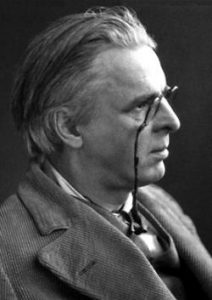
An Image from a Past Life
He. Never until this night have I been stirred.
The elaborate star-light throws a reflection
On the dark stream,
Till all the eddies gleam;
And thereupon there comes that scream
From terrified, invisible beast or bird:
Image of poignant recollection.
She. An image of my heart that is smitten through
Out of all likelihood, or reason,
And when at last,
Youth’s bitterness being past,
I had thought that all my days were cast
Amid most lovely places; smitten as though
It had not learned its lesson.
He. Why have you laid your hands upon my eyes?
What can have suddenly alarmed you
Whereon ’twere best
My eyes should never rest?
What is there but the slowly fading west,
The river imaging the flashing skies,
All that to this moment charmed you?
She. A sweetheart from another life floats there
As though she had been forced to linger
From vague distress
Or arrogant loveliness,
Merely to loosen out a tress
Among the starry eddies of her hair
Upon the paleness of a finger.
He. But why should you grow suddenly afraid
And start — I at your shoulder —
Imagining
That any night could bring
An image up, or anything
Even to eyes that beauty had driven mad,
But images to make me fonder?
She. Now she has thrown her arms above her head;
Whether she threw them up to flout me,
Or but to find,
Now that no fingers bind,
That her hair streams upon the wind,
I do not know, that know I am afraid
Of the hovering thing night brought me.
William Butler Yeats
(1865-1939)
An Image from a Past Life
• fleursdumal.nl magazine
More in: Archive Y-Z, Archive Y-Z, Yeats, William Butler

A Poet to his Beloved
I bring you with reverent hands
The books of my numberless dreams,
White woman that passion has worn
As the tide wears the dove-grey sands,
And with heart more old than the horn
That is brimmed from the pale fire of time:
White woman with numberless dreams,
I bring you my passionate rhyme.
William Butler Yeats
(1865-1939)
A Poet to his Beloved
• fleursdumal.nl magazine
More in: Archive Y-Z, Archive Y-Z, Yeats, William Butler
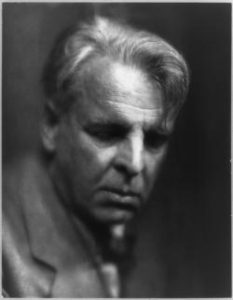
When Helen lived
We have cried in our despair
That men desert,
For some trivial affair
Or noisy, insolent sport,
Beauty that we have won
From bitterest hours;
Yet we, had we walked within
Those topless towers
Where Helen walked with her boy,
Had given but as the rest
Of the men and women of Troy,
A word and a jest.
William Butler Yeats
(1865-1939)
When Helen lived
• fleursdumal.nl magazine
More in: Archive Y-Z, Archive Y-Z, Yeats, William Butler

The Arrow
I thought of your beauty, and this arrow,
Made out of a wild thought, is in my marrow.
There’s no man may look upon her, no man,
As when newly grown to be a woman,
Tall and noble but with face and bosom
Delicate in colour as apple blossom.
This beauty’s kinder, yet for a reason
I could weep that the old is out of season.
William Butler Yeats
(1865-1939)
The Arrow
• fleursdumal.nl magazine
More in: Archive Y-Z, Archive Y-Z, Yeats, William Butler
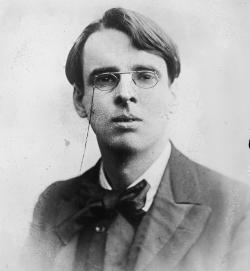
All Things can tempt Me
All things can tempt me from this craft of verse:
One time it was a woman’s face, or worse –
The seeming needs of my fool-driven land;
Now nothing but comes readier to the hand
Than this accustomed toil. When I was young,
I had not given a penny for a song
Did not the poet sing it with such airs
That one believed he had a sword upstairs;
Yet would be now, could I but have my wish,
Colder and dumber and deafer than a fish.
William Butler Yeats
(1865-1939)
All Things can tempt Me
• fleursdumal.nl magazine
More in: Archive Y-Z, Archive Y-Z, Yeats, William Butler
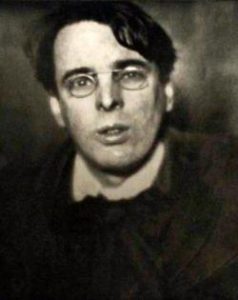
The Realists
Hope that you may understand!
What can books of men that wive
In a dragon-guarded land,
Paintings of the dolphin-drawn
Sea-nymphs in their pearly wagons
Do, but awake a hope to live
That had gone
With the dragons?
William Butler Yeats
(1865-1939)
The Realists
• fleursdumal.nl magazine
More in: Archive Y-Z, Archive Y-Z, Yeats, William Butler
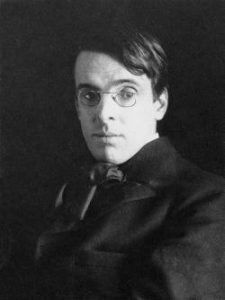
The Mask
‘Put off that mask of burning gold
With emerald eyes.’
‘O no, my dear, you make so bold
To find if hearts be wild and wise,
And yet not cold.’
‘I would but find what’s there to find,
Love or deceit.’
‘It was the mask engaged your mind,
And after set your heart to beat,
Not what’s behind.’
‘But lest you are my enemy,
I must enquire.’
‘O no, my dear, let all that be;
What matter, so there is but fire
In you, in me?’
William Butler Yeats
(1865-1939)
The Mask
• fleursdumal.nl magazine
More in: Archive Y-Z, Archive Y-Z, Yeats, William Butler

He tells of the Perfect Beauty
O cloud-pale eyelids, dream-dimmed eyes,
The poets labouring all their days
To build a perfect beauty in rhyme
Are overthrown by a woman’s gaze
And by the unlabouring brood of the skies:
And therefore my heart will bow, when dew
Is dropping sleep, until God burn time,
Before the unlabouring stars and you.
William Butler Yeats
(1865-1939)
He tells of the Perfect Beauty
• fleursdumal.nl magazine
More in: Archive Y-Z, Archive Y-Z, Yeats, William Butler

A Coat
I made my song a coat
Covered with embroideries
Out of old mythologies
From heel to throat;
But the fools caught it,
Wore it in the world’s eyes
As though they’d wrought it.
Song, let them take it,
For there’s more enterprise
In walking naked.
William Butler Yeats
(1865-1939)
A Coat
• fleursdumal.nl magazine
More in: Archive Y-Z, Archive Y-Z, Yeats, William Butler

Maid Quiet
Where has Maid Quiet gone to,
Nodding her russet hood?
The winds that awakened the stars
Are blowing through my blood.
O how could I be so calm
When she rose up to depart?
Now words that called up the lightning
Are hurtling through my heart.
William Butler Yeats
(1865-1939)
Maid Quiet
• fleursdumal.nl magazine
More in: Archive Y-Z, Archive Y-Z, Yeats, William Butler
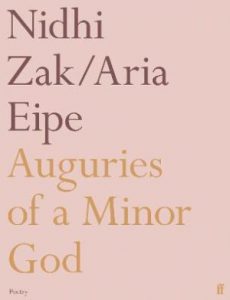 The debut collection of poetry from a virtuosic, compassionate new voice.
The debut collection of poetry from a virtuosic, compassionate new voice.
Nidhi Zak/Aria Eipe is a poet, pacifist and fabulist.
Born in India, she grew up across the Middle East, Europe and North America before calling Ireland home.
Founder of the Play It Forward Fellowships, she serves as poetry editor at Skein Press and Fallow Media, contributing editor for The Stinging Fly and an advisory board member of Ledbury Poetry Critics Ireland.
She is the recipient of a Next Generation Artist Award in Literature from the Arts Council of Ireland and the inaugural Ireland Chair of Poetry Student Award.
Nidhi Zak/Aria Eipe’s spellbinding debut poetry collection explores love and the wounds it makes. Its first half is composed of five sections, corresponding to the five arrows of Kama, the Hindu God of Love, Desire and Memory. Each arrow has its own effect on some body – a very real, contemporary body – and its particular journey of love.
The second is a long narrative poem, ‘A is for [Arabs]’, which follows a different kind of journey: a family of refugees who have fled to the West from conflict in an unspecified Middle Eastern country. With an extraordinary structure, yoking abecedarian and Fibonacci sequences, it is a skillful and intimate account of migration and exile, of home and belonging.
Auguries of a Minor God
by Nidhi Zak/Aria Eipe
Publisher: Faber & Faber
September 7, 2021
Language: English
Paperback: 120 pages
ISBN-10 : 0571365566
ISBN-13: 978-0571365562
£10.99
• fleursdumal.nl magazine
More in: #Modern Poetry Archive, - Book News, Archive E-F, Archive E-F, Archive Y-Z, Archive Y-Z
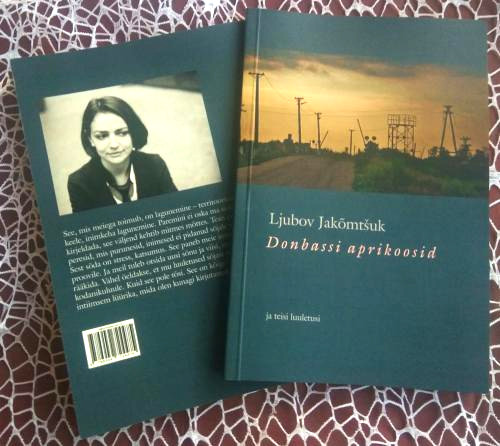
we will walk back, even with bare feet
if we don’t find our home in the place where we left it
we will build another one in an apricot tree
out of luscious clouds, out of azure ether
Apricots of Donbas—by award-winning contemporary Ukrainian poet Lyuba Yakimchuk—is the 7th book in the Lost Horse Press Contemporary Ukrainian Poetry Series. As are previous volumes in the Series, it has been released in a dual-language edition.
Born and raised in a small coal-mining town in Ukraine’s industrial east, Yakimchuk lost her family home in 2014, when the region was occupied by Russian-backed militants, and her parents and sister were forced to flee as refugees.
Reflecting the complex emotional experiences of a civilian witnessing a gradual disintegration of her familiar surroundings, Yakimchuk’s poetry is versatile, ranging from sumptuous verses about the urgency of erotic desire in a war-torn city to imitations of child-like babbling about the tools and toys of military combat.
Playfulness in the face of catastrophe is a distinctive feature of Yakimchuk’s voice, evoking the legacy of the Ukrainian Futurists of the 1920s. The poems’ artfulness goes hand in hand with their authenticity, offering intimate glimpses into the story of a woman affected by a life-altering situation beyond her control.
(…)
my friends are hostages
and I can’t reach them, I can’t do netsk
to pull them out of the basements
from under the rubble
yet here you are, writing poems
ideally slick poems
high-minded gilded poems
beautiful as embroidery
there’s no poetry about war
just decomposition
only letters remain
and they all make a single sound — rrr
(…)
Lyuba Yakimchuk from Decomposition,
translated from the Ukrainian by Oksana Maksymchuk and Max Rosochinsky
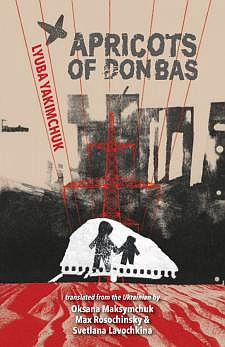 Lyuba Yakimchuk
Lyuba Yakimchuk
is a poet, playwright, and screenwriter. Her two collections of poetry, Moda (2009) and Abrykosy Donbasu (2015) won prestigious awards, including the International Slavic Poetic Award (Ukraine) and the International Poetic Award of the Kovalev Foundation (USA). Since 2019, her play The Wall has been running at the Ivan Franko National Academic Drama Theater, the largest in Ukraine. She also authored the script for the film The Slovo House: An Unfinished Novel, reflecting on the literary life in the 1930’s Kharkiv. Born and raised in a small town near Luhansk, Yakimchuk now lives in Kyiv, Ukraine.
Born and raised in a small coal-mining town in Ukraine’s industrial east, Yakimchuk lost her family home in 2014 when the region was occupied by Russian-backed militants and her parents and sister were forced to flee as refugees. Reflecting her complex emotional experiences, Yakimchuk’s poetry is versatile, ranging from sumptuous verses about the urgency of erotic desire in a war-torn city to imitations of childlike babbling about the tools and toys of military combat. Playfulness in the face of catastrophe is a distinctive feature of Yakimchuk’s voice, evoking the legacy of the Ukrainian Futurists of the 1920s. The poems’ artfulness go hand in hand with their authenticity, offering intimate glimpses into the story of a woman affected by a life-altering situation beyond her control.
# new poetry
APRICOTS OF DONBAS
poems by Lyuba Yakimchuk
Translated by Oksana Maksymchuk,
Max Rosochinsky & Svetlana Lavochkina
Oktober 2021
Paperback
166 pp
ISBN 978-1-7364323-1-0
Lost Horse Press
$30.00
• fleursdumal.nl magazine
More in: #Modern Poetry Archive, - Book News, Archive Y-Z, Archive Y-Z, Art & Literature News, Yakimchuk, Lyuba
Thank you for reading Fleurs du Mal - magazine for art & literature